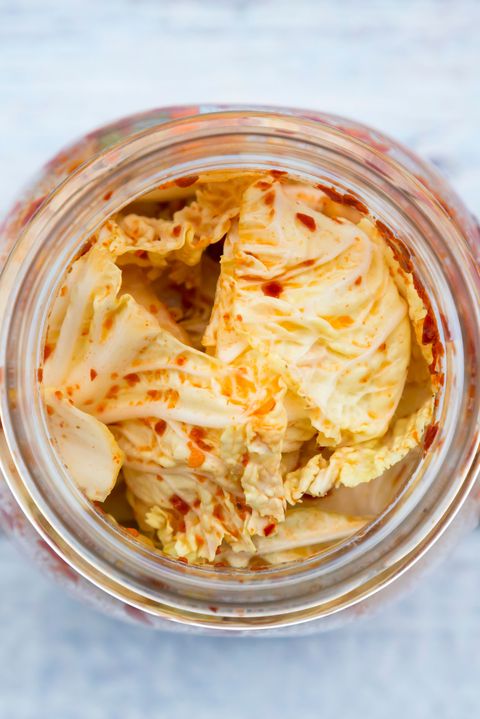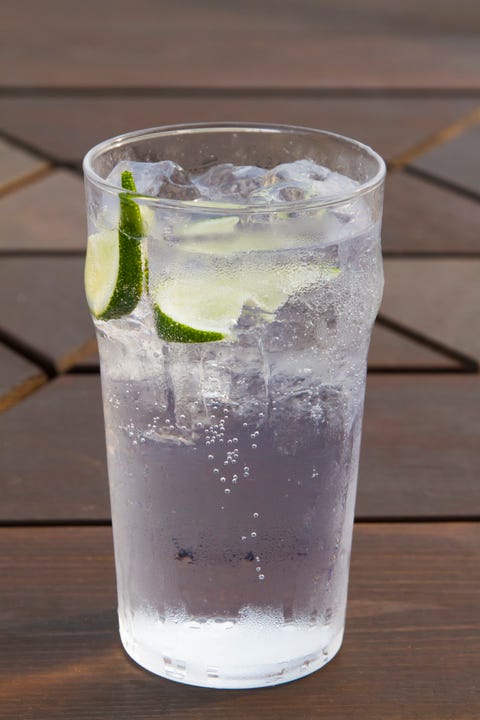Feel Bloated How to Get Rid of It

Getty Images
1 of 50
Eat Probiotics
Making probiotics a regular part of your diet can help keep the bacteria in your gut happy, which in turn regulates your digestive system and reduces bloat, reports the Cleveland Clinic. Foods like yogurt, miso, and tempeh have the strains you're looking for, and you can always talk to your doctor to see if supplements are an option.

Westend61
2 of 50
Regularly Sip On Water
Making sure you're properly hydrated is obviously good for your health. But drinking water throughout the day can also prevent constipation, which contributes to bloat, says Keri Gans, R.D., author of The Small Change Diet. Down a 16-ounce glass a half-hour before you eat — a recent study found that those who did lost weight faster than their less-hydrated counterparts.

Getty Images
3 of 50
Stock Up on Asparagus
There's never a bad time for asparagus. The veggie contains inulin, a dietary fiber and prebiotic that helps gut bacteria flourish, in turn preventing bloat and giving your overall digestive health a boost.

Getty Images
4 of 50

Getty Images
5 of 50
Avoid Foods With Way Too Much Sodium
Hands off that shaker, as experts cite salt as being one of the most common causes of bloat. When you eat too much of it — which most Americans do — it causes fluid buildup that increases your blood volume, makes your heart work harder, and gives you a distended stomach. To cut back on your intake, check the percentage of salt on the nutrition label; any more than 20 percent per serving means you've gone overboard.

Getty Images
6 of 50

Getty Images
7 of 50
Pack On the Potassium
Some fruits and veggies — like mangoes, bananas, spinach, and tomatoes — are loaded with potassium, a nutrient that's great for flattening your stomach. Experts say it helps offset sodium to balance the body.

Getty Images
8 of 50
Include Bananas In Your Daily Diet
Slather on some peanut butter and munch on these for breakfast or as an afternoon snack. Nanners are filled with fiber and potassium, both of which relieve water retention, Gans says.

Getty Images
9 of 50
Eat Water-Heavy Fruits
High-water-content fruits help flush out belly-bloating sodium, Gans says. Plus, the abundance of water will help you feel full without that weighed-down feeling. Don't know which fruits to grab? Research shows watermelon contains citrulline, an amino acid that can improve blood flow and reduce fatigue, giving you more energy to power through a busy day.

Getty Images
10 of 50
Limit Artificial Sweeteners
Artificial sweeteners may seem like a better alternative to sugary foods, but the truth is they might not be the best option for your stomach. "Many people have a hard time digesting artificial sweeteners," says Patricia Raymond, M.D., a gastroentrerologist in Chesapeake, VA. Yes, you may be cutting back on actual sugar, but you could end up dealing with excess gas or diarrhea as a result.

Getty Images
11 of 50
Skip the Seltzer
It may not be as bad as sugary, caffeinated sodas, but seltzer is a common culprit of bloat. The bubbles can cause your belly to expand, so steer clear of anything with carbonation.

Getty Images
12 of 50

Getty Images
13 of 50
Eat More Salmon
Salmon is loaded with omega-3 fatty acids, which Gans says are important fats that reduce inflammation in your stomach. If you're looking for new ways to cook the fish, we've got over 200 recipes for inspiration.

Getty Images
14 of 50
Get Active
Whether you prefer yoga in the morning or busting out leg exercises in the evening, getting in 15 to 20 minutes of activity each day can help fight constipation and keep things moving through your digestive tract, Dr. Raymond says.

Jena Ardell
15 of 50
Try Low-Sodium Recipes
We all love a good bowl of chicken noodle, but make it with low-sodium broth next time. Gans says salty canned soups promote bloat, and it's always best to go the homemade route when possible.

Getty Images
16 of 50
Snack On Almonds
When you hit that afternoon energy slump, Ashley Koff, R.D., suggests reaching for unsalted nuts as a filling afternoon snack. Key word: Unsalted. Remember, too much sodium can cause bloat.

Getty Images
17 of 50
Say Yes to Caffeine
Ever wonder why that morning latte always has you running for the ladies' room? It's because caffeine stimulates colonic muscle contractions that are similar to the ones experienced after eating a big meal. So if you're struggling with constipation, have a cup of joe to help get things moving.

Getty Images
18 of 50
Eat an Early Dinner
To avoid waking up with a puffed-out stomach, experts recommend having dinner earlier in the day. This way your body has plenty of time to digest (and deflate) before you hit the sheets.

Getty Images
19 of 50

Getty Images
20 of 50
Beware of Sneaky Salt
Foods with high amounts of sodium in them are always a no-no, experts say, but some culprits — like bread or cereal — aren't obvious. Remember to check food labels before indulging.

Getty Getty Images
21 of 50
Avoid Sugar-Free Candy
Seeing "sugar-free" on a label convinces many that it's a healthy item, but don't be fooled: Diet snacks often contain sneaky sweeteners like xyitol, sorbitol, and maltitol, which Gans says can cause GI distress and lead to excess bloat and diarrhea.

Getty Images
22 of 50
Up Your Calcium Intake
If your clothes feel tighter right around the time your period begins, you're probably not getting enough calcium. Abbey Sharp, R.D., says you should up your intake a week before your period begins, aiming for at least 1,000 mg a day. Getting enough magnesium (about 320 mg) can help relieve PMS symptoms, too.

Getty Images
23 of 50
Massage Your Tummy
Next time you feel bloated, try massaging your stomach in the direction of your GI tract. Press your fingers right near your right hip; slide up toward the ribs, then across and down near your colon in a circular motion. It sounds weird, but Dr. Raymond says the movement can help evacuate gas and relieve your stomach.

Getty Getty Images
24 of 50
Eat More Avocado
Spread it on toast, add it to your salad, or make it into guac. No matter how you choose to eat avocado, you'll be getting a healthy dose of monounsaturated fats that help keep you full sans belly bulge. (PS: This crazy trick will ripen any avocado in 10 minutes.)

Getty Images
25 of 50
Do Belly Stretches In Bed
Get your digestive system on track before leaving the bedroom. Lie on your back with both knees tucked into your stomach for a few minutes. Then, relax your belly by slowly twisting your legs from side to side, Koff suggests. The movement will help soothe your belly and prevent bloat.

Getty Images
26 of 50
Choose Fresh Lunch Meat
Not all lunch meats are created equal. While fresh-carved turkey or a plain piece of grilled chicken is OK, Gans says some meats, like bologna, are packed with sodium and tough-to-digest fat. Sorry, hot dogs — that means you're out.

Getty Images
27 of 50
Eat Half Portions Of Broccoli
This nutritient-packed veggie — and other cruciferous vegetables like it — can make some people gassy and bloated if eaten raw. You don't need to avoid it completely, but Gans says eating a half-cup serving at a time can help reduce bloat.

Getty Images
28 of 50
Replace White Rice for Brown
Because it's a complex carb, brown rice takes longer to digest, which means that it'll keep you full but won't stick out your stomach.

Getty Images
29 of 50
Manage Your Antibiotic Intake
Some antibiotics, like painkillers and iron supplements, can alter the microbial and metabolic patterns of your gut, says Kate Scarlata, R.D. That changes not only its gas content — so how puffy it makes you feel — but also how fast or slow your intestine moves. If you think your meds may be causing stomach issues, ask your doctor about alternatives.

Getty Images
30 of 50
Feel Bloated How to Get Rid of It
Source: https://www.redbookmag.com/body/health-fitness/g2879/how-to-reduce-stomach-bloating/